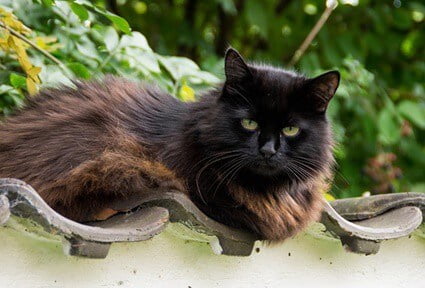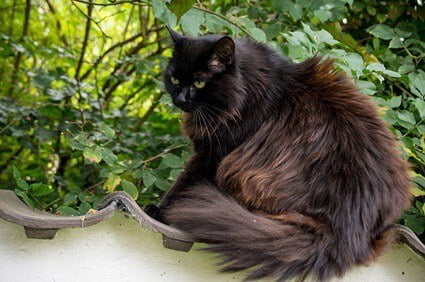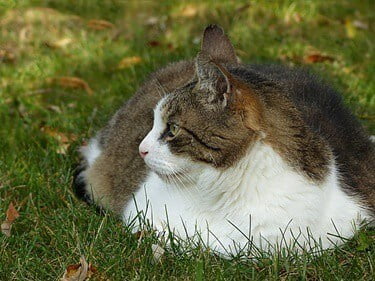Overweight cats may be more cuddly, but they also suffer from a diverse range of health problems. The lifespans of obese cats are shortened significantly. Being overweight places stress on a cat’s body, which is designed to be lean and agile. Joint problems and early-onset arthritis are common among fat cats, as are heart conditions and diabetes. Cats that are carrying too much weight will experience mobility and breathing difficulties.
Obese cats live for an average of 5-10 years less, depending on how much excess weight they’re carrying. Fatty tissues release harmful compounds into cats’ bodies and can compromise their immune systems. Overweight cats are more likely to develop severe health problems due to living physically inactive lifestyles.
Cats may be gluttonous at times, but owners make the mistake of indulging them with too many treats. It is essential that a cat eats a balanced diet and gets regular exercise opportunities. If your cat is on the portly side, you need to take steps to get your cat to shed any excess pounds.
How Long Do Obese Cats Live?
According to The State University of New Jersey, indoor house cats live for an average of 15-17 years, and it’s not uncommon for healthy cats to live for 20+ years. However, the life expectancy of overweight cats will be reduced by 5 years, and chronically obese cats will die up to 10 years earlier.
Obesity leads to various health problems. These place additional stresses on the body and lead to a reduced lifespan. In part, this is because fat itself is not a benign collection of excess calories. Fatty tissues are active and release hormones that cause inflammation of the body’s tissues.
A new perspective on obesity suggested by some vets is to consider it a chronic, low-grade inflammatory condition. In allowing your cat to remain obese, you are effectively culling its life expectancy by about 1/3. This could be as much as 1/2 when a cat is chronically obese.
It is estimated that 30-35% of domesticated cats in North America are obese. Other studies suggest that almost half of house cats are overweight.
How Much Do Fat Cats Weigh?
If the cat is 10-20% above the ideal weight for its size and breed, it is considered overweight or obese. Most vets will use the 9-point scoring system to grade a cat’s weight. A score of 6.5 or 7 marks a healthy weight.
Cat breeds vary in size, and males tend to be larger than females. This means that judging when a delicate Siamese is overweight will be quite different from a beefy Maine coon. To assist, we’ve compiled a list of healthy weights for the most common cat breeds. Compare these weights to your own cat to determine if it’s a healthy weight.
These weights are a guide only. If your cat is smaller or larger in size (not weight) than the average for its breed, then its healthy weight will be different. There can also be a different healthy weight for males and females.
If you know the optimal weight for your cat specifically, calculate the difference between this weight and its current weight. If what you are left with is 10% or more of its healthy weight, it is overweight.
Cat Weight Table
| Cat Breed | Male (Normal) | Female (Normal) | Male (Obese) | Female (Obese) |
|---|---|---|---|---|
| Maine Coon | 15-25 lbs | 11-20 lbs | 25 lbs+ | 20 lbs+ |
| Persian | 12 lbs | 8-12 lbs | 12 lbs+ | 12 lbs+ |
| Siamese | 11-15 lbs | 8-12 lbs | 15 lbs+ | 12 lbs+ |
| American Shorthair | 12 lbs | 8-12 lbs | 12 lbs+ | 12 lbs+ |
| Domestic Longhair | 11-15 lbs | 7-11 lbs | 15 lbs+ | 11 lbs+ |
| Russian Blue | 10-12 lbs | 7-10 lbs | 12 lbs+ | 10 lbs+ |
| Birman | 7-12 lbs | 6-8 lbs | 12 lbs+ | 8 lbs+ |
| Ragdoll | 12-20 lbs | 8-15 lbs | 20 lbs+ | 15 lbs+ |
| Sphynx | 8-11 lbs | 6-8 lbs | 11 lbs+ | 8 lbs+ |
Signs of Obesity In Cats
A cat’s physical weight alone isn’t always an indicator that it is overweight. Your cat’s weight may be the average for its breed. However, if it is small for its breed but weighs the same as an average specimen, it may be overweight. These signs of weight gain in cats are useful for identifying obesity early on:
Visual
A paunch is actually called the primordial pouch. It’s where most excess fat will be stored until the animal becomes obese. In most cases, your cat’s stomach should be taught and tucked.
Fat will mostly be stored on the cat’s waist, belly, chest, and abdomen. Its legs and tail rarely contain fat stores and will remain slim. You can feel along the cat’s belly for fat stores. Accounting for fur density, you should be able to feel its ribs without applying too much pressure. There should also be a slight deposit of fat at the base of the cat’s tail.
Stand over your cat and look down at it. There should be a gentle indentation at its waist and no obvious bulges. The cat’s sides should dip and curve following the shoulders, ribs, and hips. From above, its body should not look like a rounded football.
Behavioral
A lack of activity is not only a cause for weight gain but a symptom. Some cat breeds are naturally less active than others. Bengals are far more energetic than Scottish folds, for example. However, there is a difference between being laid back and having no ability or desire to move.
Closely observe your cat’s interest in staying active. Try tempting it with toys and games, or place treats in places that force it to climb or jump. Call its name and encourage it to come to you. If it shows disinterest in any of these activities, it could be a sign of weight gain.
Difficulty breathing or strained breathing, in general, or after light to medium activity, is a big sign that your cat’s body is struggling with its weight. Noting such problems should inspire a visit to the vet. A specific exercise regime will be prescribed that helps the cat lose weight without straining it too much physically.

Reduced Mobility
Once a cat has gained enough weight, it will actually struggle to groom itself. Given that cats are fastidious about grooming and being clean, this is a major warning sign. Observe your cat while grooming and see if it struggles to reach areas.
Reduced mobility will also impact the cat’s ability to play, jump, and move in general. It may be disinterested in moving, but it may also simply struggle to. This is the sadder side of obesity in cats, and all pets, as the quality of their life lessens depressingly.
What Age Do Fat Cats Die?
It is difficult to say exactly what age obese cats will die. The average lifespan of each breed differs. Likewise, the severity of the obesity and health of the animal must be taken into account.
In general, obese cats die in their middle-age years. For most cats, this means between 6-10 years. Intervention from a vet, a healthy diet, and plenty of exercise will improve your cat’s lifespan.
Do Overweight Cats Die Sooner?
Overweight cats have been found to die far sooner than leaner, healthier individuals. These animals also have a far greater chance of developing health problems, some of which can be life-threatening. If untreated, obesity in cats will lead to the animal’s life expectancy being reduced. This happens from:
- The stresses and toxic compounds the fatty tissues excrete
- The ensuing health problems
Obese Cat Health Problems
Acta Vet Scand notes that the prevalence of obesity in cats needs to be addressed due to how negatively it affects their health (and ultimately their lifespan). Here are some of the health problems that can occur if your feline is overweight:
Diabetes
Cats can develop diabetes, and it can become a life-threatening illness without treatment. Overweight cats are more at risk of developing diabetes than other cats.
Joint Issues
All of the extra weight that an obese cat has to carry around takes a serious toll on its joints. Cats are meant to be light-weight, spry animals. This is how their bodies have evolved. When such a body has to deal with the stresses of obesity, it struggles. Overweight cats will see their joints develop arthritis far earlier than usual. This will eventually become debilitating.
Urinary Tract Infections and Bladder Stones
Overweight cats are more likely to suffer urinary tract infections and bladder stones. These will need treatment.
Heart Disease
Heart disease is a common side effect. An overweight cat has a greater chance of developing heart disease and all other heart conditions. This includes hypertension (high blood pressure.)
Hypertension is when the heart has to work harder than it should to keep blood and oxygen pumping throughout the body. The arteries cannot cope with the extra strain, and blood pressure increases in response.
The relationship between heart health and obesity is well documented. Cats can experience a number of heart issues from being overweight.
Cancer
Obesity increases the risk of developing numerous types of cancer. In part, this is because of the inflammatory compounds the fatty tissues release into the body.

Weakened Immune System
A body under constant strain from being overweight will have a weakened immune system. The amount of excess hormones, compounds, and stresses a body must combat means that it cannot effectively fight off infection and illness.
Even if the cat doesn’t develop health issues directly from being obese, it is more vulnerable to other illnesses.
How To Help My Fat Cat
The first step in helping your overweight cat is to take it to the vet. An expert will conduct a thorough examination and prescribe the best treatment moving forward. In most cases, this will involve a strict diet and daily exercise.
When a cat is morbidly obese or suffering physically, exercise can be difficult or impossible. Aquatic therapies are an option, depending on the situation and the cat’s temperament. Medications may be necessary if it has health complications.
A sudden change in diet can upset many cats when they’re used to yummy food and treats all the time. Don’t give in to their plaintive cries. Stick with the diet. They may not thank you for it, but they will benefit from it.
Is A Fat Cat Unhealthy?
A fat cat is 10-20%, or more, above its ideal body weight. These animals are unhealthy and are more likely to develop serious health conditions, such as diabetes, heart disease, circulatory problems, and arthritis.
Overweight cats live shorter lives than their lean counterparts. An overweight cat will live 5 years shorter, on average. Obese cats will die up to 10 years earlier. Anyone concerned that their cat is carrying too much weight should ask their vet to formulate a balanced diet and exercise plan for feline weight loss.

